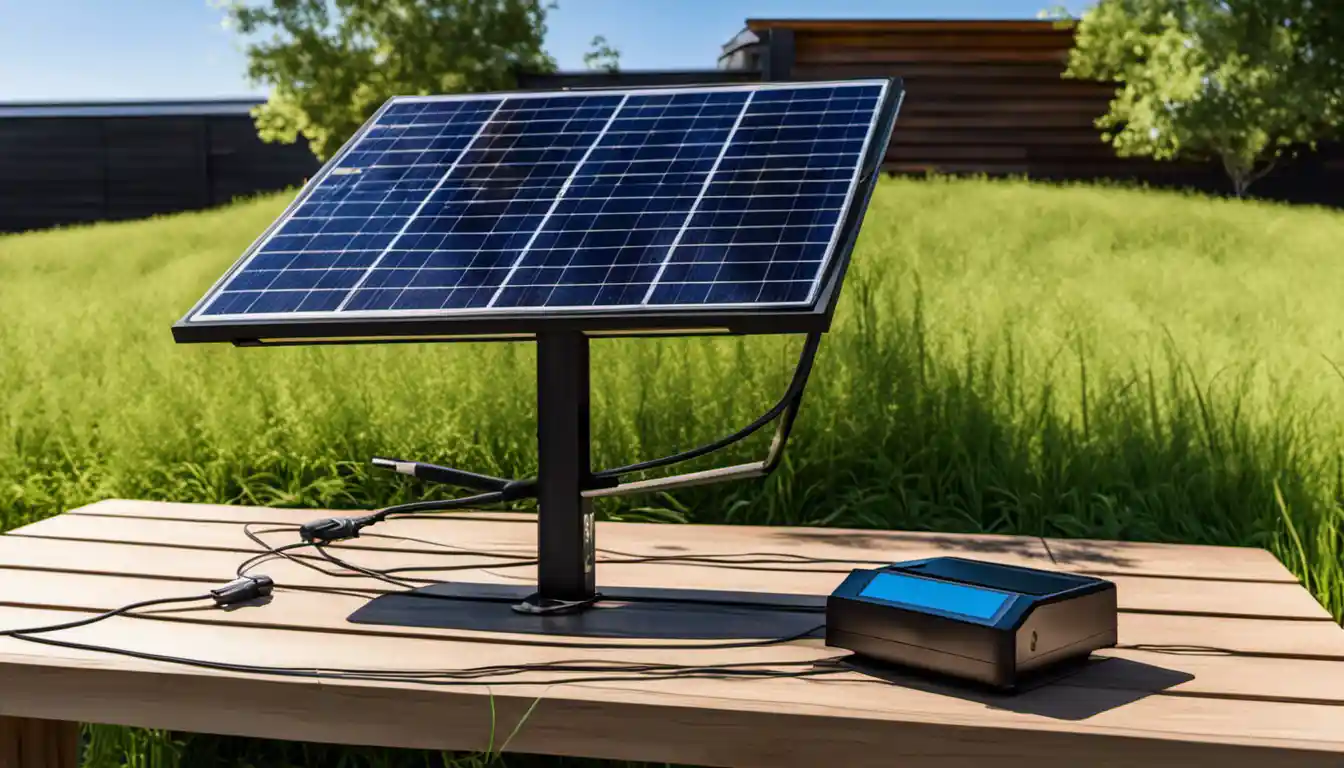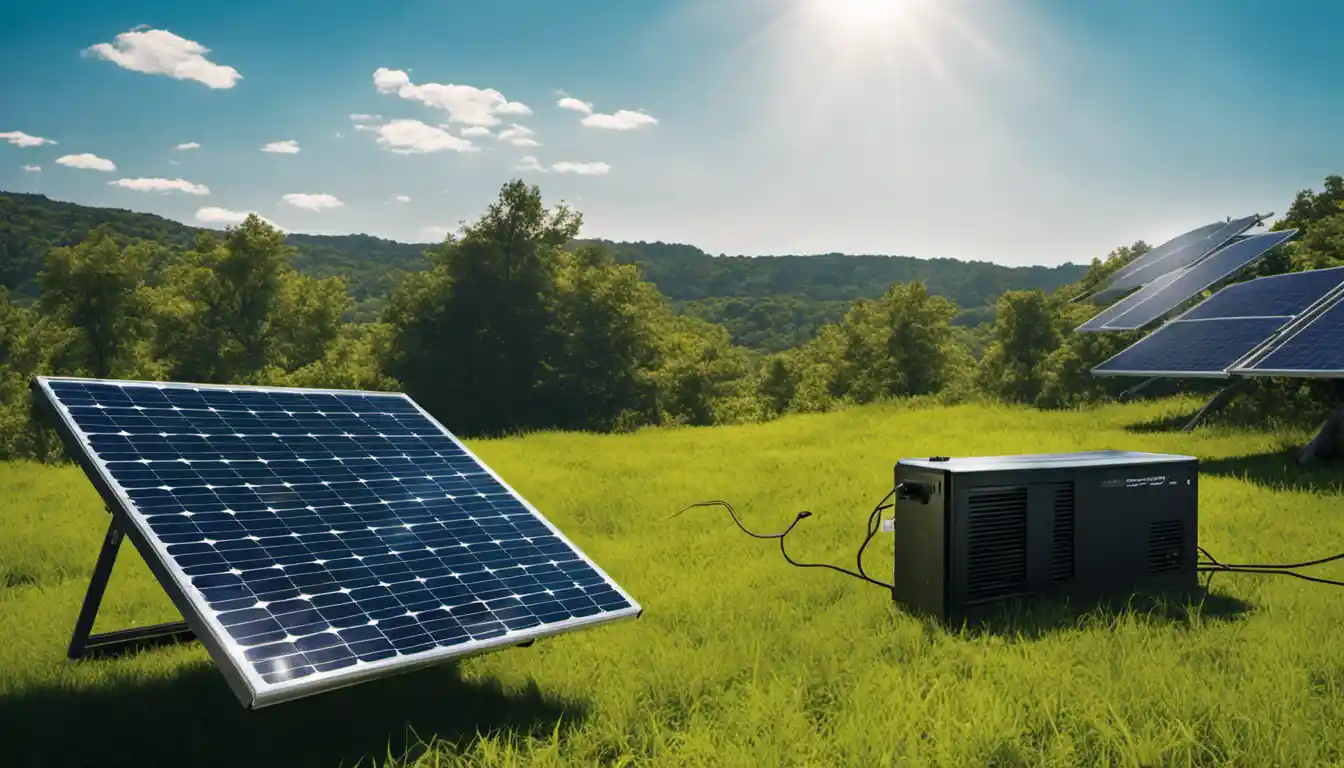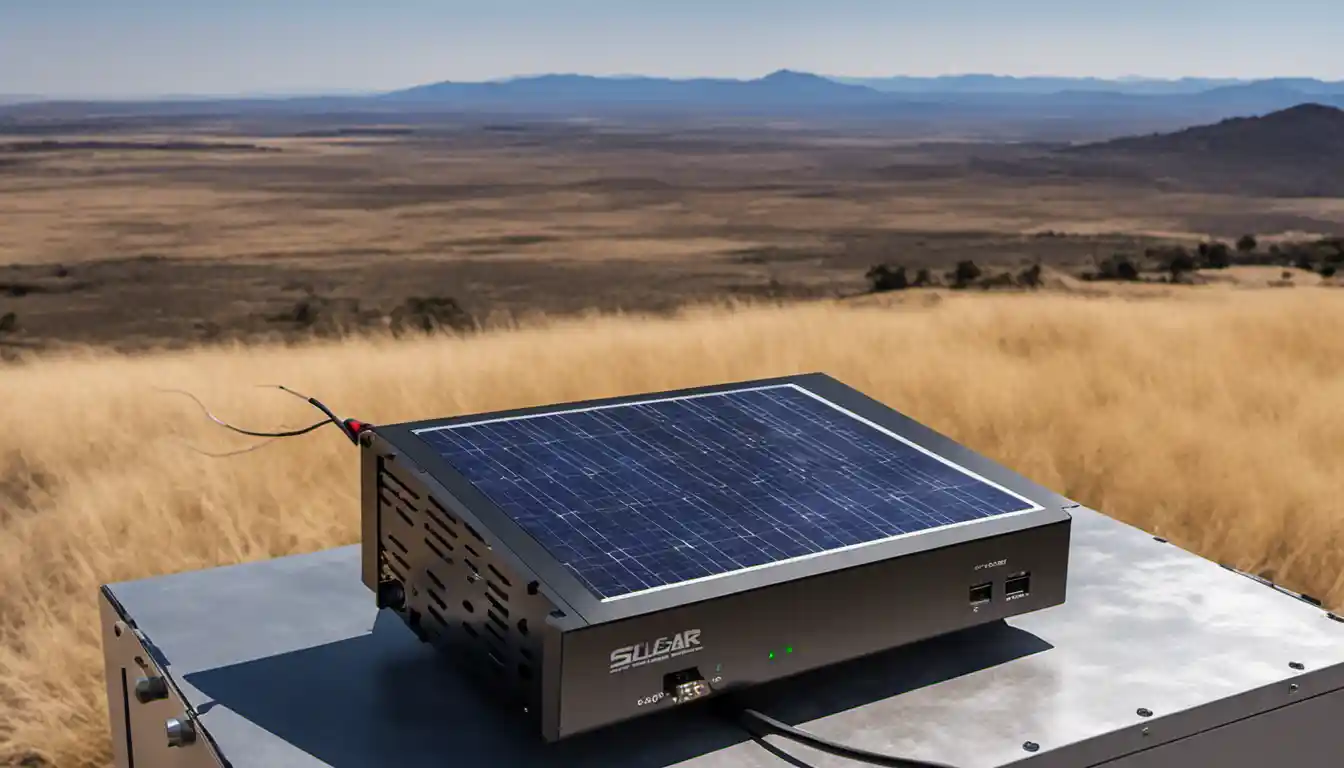Understanding the Basics of Solar Panels and Car Batteries
To keep a car battery charged, a solar panel that produces around 10 – 20 watts is typically sufficient. However this depends on factors like the size of the battery, and the amount of sunlight the panel gets. Always check the specific requirements of your battery.
Fundamentals of Solar Panels
Solar panels are ingenious devices that convert sunlight into electricity. These panels are made up of photovoltaic cells that release electrons when hit by sunlight, which then flow through the circuit, producing current. This green and renewable energy source is increasingly used for numerous applications that range from powering homes to charging electric cars.
How Car Batteries Operate
Your car battery acts like a miniature powerhouse, storing energy and supplying it to your vehicle’s starter and other electrical accessories. Car batteries are 12-volt lead-acid units that consist of six cells, and when fully charged, put out about 12.6 volts.
Overview of How Solar Panels Charge Car Batteries
The solar panels’ photovoltaic cells generate a flow of electrons resulting in DC power. This energy, however, is not immediately fit to charge your car battery. The voltage needs to be regulated correctly to avoid overcharging the battery, and that’s where a solar charge controller comes into play, but more on that later.
The Effects of Wattage on Charging Car Batteries
Definition and Importance of Wattage
Solar panel output is measured in watts (W), which is essentially a unit of power. Wattage signifies how much electricity a solar panel produces when under full sunlight. It’s important to understand that the effectiveness with which a solar panel will charge a car battery depends significantly on its wattage.
How Wattage Impacts Charging Time
The charging time of a battery depends primarily on two factors: the capacity of the battery (measured in amp-hours, Ah) and the wattage of the solar panel. More wattage typically equates to faster charging times, while lower wattage will extend the charge duration. For instance, charging a 12V battery with a 5W solar panel will take significantly more time compared to a 20W panel.
Charging a 12V Battery with a 5W Solar Panel
Materials and Tools Required

To charge a 12V battery with a 5W solar panel, you will need:
- 5W Solar Panel
- Solar Charge Controller (10A would be sufficient)
- 12V Car Battery
- Connecting Cables
- And of course, abundance of sunlight!
Step-by-step Guide to Connect the Battery to a Charger Controller
- Before connecting the battery to the charge controller, make sure the battery is fully disconnected from any circuits.
- Using the correct cable sizes, connect the battery to the ‘battery terminals’ on the charge controller.
Connecting the 5W solar panel to the Charge Controller
- Link the solar panel to the ‘solar terminals’ on the charge controller using the appropriate cables.
Testing the Setup
You can verify the correct working of this setup by measuring the voltage across the terminals of the battery. If all is working properly, it should be around 13-14 volts.
Estimating Charge Time with a 5W Solar Panel
Let’s say we have a 12V, 50Ah battery. With a 5W panel producing an average of roughly 5/12 or 0.42 ampere (A) in full sunlight, it would theoretically take around 50/0.42 or 119 hours of bright sunlight to charge the battery from empty to full.
Comparative Analysis of Different Solar Panel Sizes and Their Efficiency
Now that we understand how different wattages relate to differing charging times, let’s dive into a comparative analysis contemplating different solar panel sizes.
Charging a 12V Battery with a 20W Solar Panel
To illustrate, let’s assume a 20W solar panel working at a more realistic efficiency of about 75%. Generating around 1.25A, it will take an estimated 40 hours to charge the 50Ah battery from flat to full—a significant improvement from our 5W panel.
Charging a 12V Battery with a 50W Solar Panel
A 50W panel at 75% efficiency generates roughly 3.13A. This enables you to charge the same 50Ah battery in around 16 hours of sunlight.
Charging a 12V Battery with an 80W Solar Panel

An 80W panel might generate about 5A at a similar efficiency, charging your 50Ah battery in nearly 10 hours of good sunlight.
Charging a 12V Battery with a 100W Solar Panel
A 100W panel, finally, will provide around 6.25A, allowing the battery to be charged in a little over 8 hours.
Sizing Solar Panel to Charge Different Capacities of 12V Batteries
Required Solar Panel Size for a 12V 50Ah Battery
As we’ve observed, even a small 5W panel can charge a 50Ah battery—albeit slowly. But if time is of the essence, a 20W panel is a better fit with consistent sunlight.
Required Solar Panel Size for a 12V 100Ah Battery
For a larger battery, like a 100Ah one, you might want to consider a more powerful 50W solar panel for more efficient charging.
Required Solar Panel Size for a 12V 120Ah Battery
For a 120Ah battery, you should ideally look at a 60-80W panel to ensure that it gets charged within a reasonable time span.
Required Solar Panel Size for a 12V 200Ah Battery
For a sizable 200Ah battery, a 100W solar panel would be a suitable choice to maintain an efficient charging rate.
Usage of Solar Charge Controller in Solar Charging
Importance of a Solar Charge Controller in the Charging Setup

A solar charge controller plays an essential role when it comes to charging a 12V battery optimally. It not only prevents overcharging—thus extending the battery’s lifespan—but also blocks back current to panels at night, preventing battery drain.
Differences Between Various Types of Charge Controllers
Charge controllers come primarily in two types: Pulse Width Modulation (PWM) and Maximum Power Point Tracking (MPPT). Generally, MPPT controllers are more efficient and capable of converting excess voltage into amperage, resulting in faster charge times.
How to Connect the Battery and the Solar Panel to the Charge Controller
For success in this, remembering this rule is critical: Always connect the battery to the charge controller first, followed by the solar panel. This way, you ensure that the controller recognizes the system voltage correctly.
Frequently Asked Questions on Sizing Solar Panels for Charging a 12V Battery
How Many Solar Panels are Required?
The number of solar panels needed will depend on their wattage and the capacity of your battery. Bigger car batteries or those demanding faster charging times will need more powerful solar panels.
Highest Size of the Solar Panel That Can be Used?
Theoretically, any size solar panel can charge a 12V battery. However, very large solar panels are impractical as they can overcharge and damage the battery if not correctly regulated by a proper charge controller.
Other Potential Sources of Charging a 12V Battery?
While this article focuses on solar power, numerous other methods exist for charging a 12V battery. They range from using a mains powered battery charger to harnessing wind power. For more detailed insight into solar’s role in powering vehicles, please visit our extensive guide dedicated to solar-powered vehicles.
Conclusion: Selecting the Right Size Solar Panel for Your Car Battery
Choosing the right size solar panel to keep your car battery charged primarily depends on your battery capacity, the amount of sunlight it’s exposed to, and how quickly you want it to charge. The beauty of solar energy lies in its malleability to meet diverse needs. Whether you want a compact solution for keeping your vehicle’s battery topped up or require a more powerful arrangement for extended trips, your solar panel selection can be easily tailored.
Remember, any day under the sun is a golden opportunity to charge your car battery with renewable energy! Keep it green, folks!



